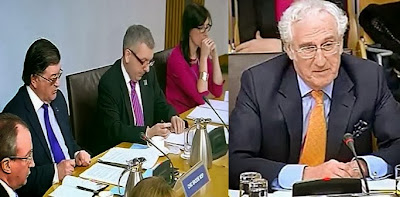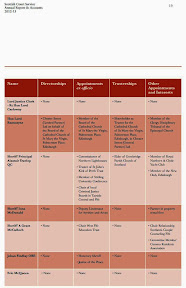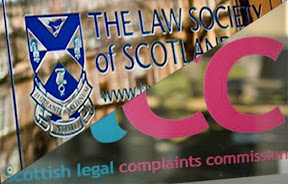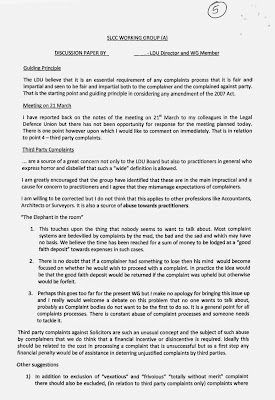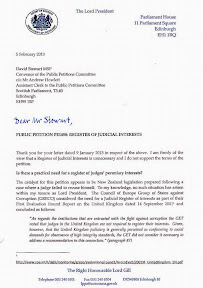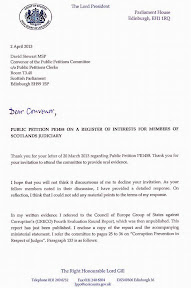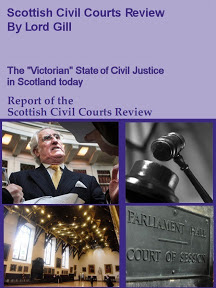Top judge comes clean on limited disclosures of judicial conflicts of interest. SCOTLAND’S top judge, the Lord President Lord Brian Gill has been forced to publish a limited amount of information on how judges recuse themselves from conflict of interests in cases being heard in Scottish Courts. However, the move to disclose recusal data has only came about after Lord Gill gave an undertaking on the issue to MSPs of the Scottish Parliament's Public Petitions Committee who are currently investigating proposals contained in Petition PE1458: Register of Interests for members of Scotland's judiciary calling for judges to declare all their interests in a published available register of judicial interests.
The publication of the limited information on recusals by Lord Gill, who has twice refused invitations to appear before msps to give evidence and face questions on his opposition to the proposal to require all members of Scotland’s judiciary to disclose their interests, is seen as an attempt to stem increasing calls for a full register of judicial interests from the media, members of the public, campaigners and Scotland’s Judicial Complaints Reviewer who all believe the plan will increase transparency and accountability in Scotland’s judiciary.
 The first ever published disclosures of albeit limited information on recusals by Scotland’s judiciary contains a brief, but important glimpse of the until now secret links between judges and others in the legal system.
The first ever published disclosures of albeit limited information on recusals by Scotland’s judiciary contains a brief, but important glimpse of the until now secret links between judges and others in the legal system.
24 March 2014 Livingston Sheriff Court Sheriff Edington. In a Civil action a recusal was recoded because a “Court report was prepared by spouse of a resident sheriff”
8 April 2014 Forfar Sheriff Court Sheriff Veal. In a Criminal case a recusal was recoded detailing the “Sheriff personally known to a witness”
10 April 2014 Selkirk Sheriff Court Sheriff Paterson. In a Civil case a recusal was recoded detailing “Sheriff had previously acted for a client in dispute against Pursuer”
23 April 2014 High Court Lady Wise. In a Criminal case a recusal was recorded detailing “Senator had previously acted for a relative of accused”
While the move to publish recusal information is welcome, there are thought to be a raft of on-going cases in the Court of Session in which recusals have not been made, where judges undeclared relationships with law firms, solicitors, and undisclosed investments including financial relationships with banks, big business and other institutions have apparently not resulted in recusals, due to the judiciary’s resistance to declare a full and true picture of their wealth, earnings and investments.
There is also an increasing suspicion that potentially hundreds of civil cases previously heard in Scotland’s courts may not have been heard fairly due to judges refusing to even consider recusing themselves or openly disclose any conflict of interest in cases they presided over. From investments in banks, to insurance firms, positions on boards, directorships, links to other public bodies, property holdings, directorships, earnings from law firms etc are but a few of the secret interests privately held by members of the judiciary which have never been declared ever in court.
And, in criminal cases, it has previously emerged that prosecutors who were promoted to judges and then proceeded to throw out appeals against people they had themselves convicted, have also refused to disclose any conflicts of interest during court hearings.
In one case reported by the media in which Mr William Beck was wrongfully convicted for a criminal offence, the now retired Lord Osborne who threw out Mr Beck’s appeal then claimed to a newspaper he had forgot he prosecuted the same man in the case years earlier. The report on this case, which has since been presented to the Petitions Committee by Mr Beck, was featured on Diary of Injustice here : Failure to Recuse : Evidence handed to MSPs in judicial register of interests proposal reveals judges who blocked injustice appeal failed to declare interests in court
This very unfair state of affairs in Scotland’s courts, where judges are writing their own rules on what they are required to disclose. and what they can keep secret, will continue until a full register of judicial interests requiring all members of Scotland’s judiciary to disclose their interests is created.
A YEAR TO RECUSE - Top judge branded register plan as ‘unworkable’, then offered disclosure on recusals after year of stalling MSPs on register of interests debate:
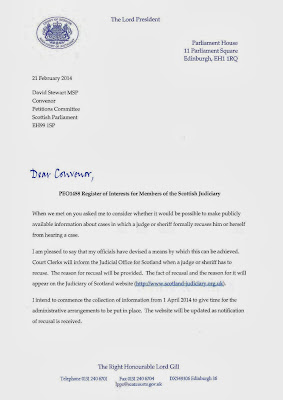 Short note from top judge gives little on transparency. Lord Gill made the offer to publish recusal data after a year of resisting calls from msps to hand over statistic on how judges dealt with conflicts of interest in court. Lord Gill’s letter to msps offering the small change said : “I am pleased to say that my officials have devised a means by which this can be achieved.
Short note from top judge gives little on transparency. Lord Gill made the offer to publish recusal data after a year of resisting calls from msps to hand over statistic on how judges dealt with conflicts of interest in court. Lord Gill’s letter to msps offering the small change said : “I am pleased to say that my officials have devised a means by which this can be achieved.
Court Clerks will inform the Judicial Office for Scotland when a judge or sheriff has to recuse. The reason for recusal will be provided. The fact of recusal and the reason for it will appear on the Judiciary of Scotland website.
I intend to commence the collection of information from 1 April 2014 to give time for the administrative arrangements to be put in place. The website will be updated as notification of recusal is received.”
The concession on recusals by Lord Gill is widely seen as having little value without a full register of interests to accompany it, and comes after the judge spent a year refusing to cooperate with msps looking for answers on the secret world of Scottish judges. Lord Gill also refused at least two invitations from the Petitions Committee to attend evidence sessions and face questions in public from the full Committee. At one point Gill even used loopholes in the Scotland Act to dodge parliamentary scrutiny with an implication judicial cooperation with Holyrood may be withdrawn over the issue.
While a welcome move, the offer by the Lord President does not tackle any of the core issue of calls for greater judicial transparency with the creation of a full register of interests for Scotland’s judiciary - a plan the top judge angrily branded ‘unworkable’, reported earlier here: Judicial Transparency is “not workable” claims Scotland’s top judge Brian Gill in private meeting with Holyrood msps on register of judicial interests petition
However, Scotland’s judiciary are well known as a group of select, predominantly white, extremely wealthy influential lawyers who have an unelected and almost unchallengeable power to stall or close debate on their own secret vested interests, change any of our lives at the stroke of a pen, or strike down legislation desired by the greater community and voted through by democratically elected politicians in our own Scottish Parliament.
Clearly any group in society which have such almost limitless power, must above all, be as transparent as other branches of government and society to which it applies its rulings. However, as Scots have discovered during a full year of debate at the Scottish Parliament’s Public Petitions Committee, if anything, the judges are even more secret than the secret service itself when it comes to the thorny question of judges pecuniary and other interests.
Their personal, undeclared wealth including extensive family and business links throughout the legal profession, offshore ‘tax efficient’ trusts, ownership of numerous and high value properties through a variety of interesting arrangements, investments, directorships and shareholdings, collectively generate millions of pounds in earnings for the judges and their families each year, yet none of it is declared because the judges write their own rules exempting themselves from transparency and any accountability over how their interests collide with their duties in court.
Petition PE1458: Register of Interests for members of Scotland's judiciary is due to be heard at the Scottish Parliament on 6 May 2014, and previous articles on the lack of transparency within Scotland’s judiciary, investigations by Diary of Injustice including reports from the Sunday Mail & Sunday Herald newspapers, and video footage of debates at the Scottish Parliament on the register of judicial interests can be found here : A Register of Interests for Scotland's Judiciary

